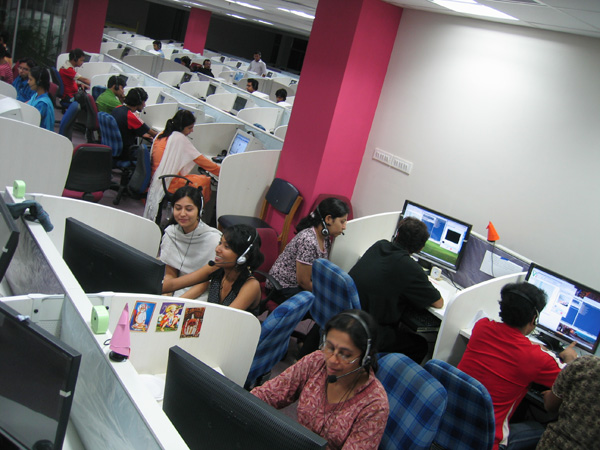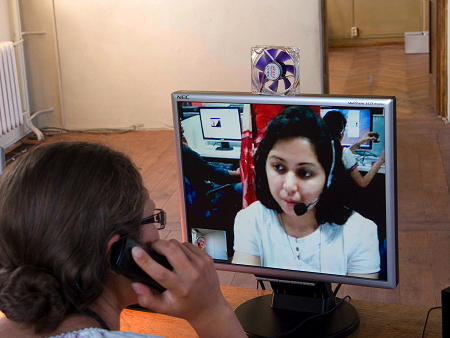A Spirit of Yes: “Call Cutta in a Box”
Quinton Skinner reports back on the "intercontinental phone play" by Rimini Protokoll, presented as part of the Walker's "Out There" series through January 31. He's not sure whether it succeeds or fails as theater, but its heart, he says, is sound.




IT IS OF COURSE NO COINCIDENCE that the hunger for connection, and the fearful consequences of isolation and alienation, make for constant and enduring themes in art. They are the prevailing conditions and preoccupations of our very existence. We are social animals, after all, and the brief spans of our lives are spent searching for contact, then playing out the consequences.
The German performance collective Rimini Protokoll has presumably spent an evening or two thinking about these matters, for its Call Cutta in a Box arrives as (on the surface, at least) the most unusual and potentially challenging of the Walker’s Out There series. In the days leading to its installation, much of the chatter surrounding it was almost giddily speculative: How weird would it be? How much would it ask of me?
Not terribly much on either count, as it turns out.
If you plan on attending the show, stop reading now — bookmark this article and come back after you’ve viewed it. You’ll want to maintain as much surprise as possible. Once the veil of mystery is lifted, Call Cutta is surprisingly slight and bare.
As an audience of one, you are led to the 40th floor of the IDS Center and into a small office. Once you are settled into your chair, the desk phone rings, and on the other end is a call center worker in India (this much was revealed in the show’s promotional materials). Depending on your point of view, this is either a jarringly dislocating moment or a phone call little stranger than those that bubble into many of our days.
The evening I attended, my counterpart was named Susmita, and she was calling me from Kolkata. She was exceedingly sweet and conspicuously bright from the outset, when she tried to put me at my ease with a series of getting-to-know you questions interspersed with some low-grade special effects. When she asked me if I wanted tea, and I replied in the affirmative, she claimed to be turning on the kettle next to me. (I could suspend disbelief momentarily, for the fun of it, but Susmita was charmingly unconvincing as an intercontinental magician.)
I was asked to locate a treat in the desk, which we would share together, but it seemed the occupant before me had absconded with all the edible goodies. Susmita resolutely kept up the parlor tricks, claiming responsibility for the photo of her daughter and housekeeper that emerged from a nearby printer, as well as the momentary rumbling of the desk (although when I told her it reminded me of earthquakes I had experienced, she seemed unsure whether I was somehow offended).
Cheap stuff, really, and Rimini Protokoll would do well to take in a show by local wizards Skewed Visions for tips on disorienting an audience with strange, poetic gestures (mechanized and otherwise). But it’s the other aspect of the show, the conversation itself, which flowed with lovely grace — and the collective deserves credit for its conception.
It almost feels like betraying a trust, recounting my chat with Susmita, and that hesitation alone indicates that Call Cutta succeeds in its own sideways fashion. Good art changes your thought patterns and infects your heart, reaches into your secret self and makes some fragment of it more presentable to the world than it had been before. And that’s where we went.
________________________________________________________
If the script wasn’t particularly acute, the overall experience was fascinating; the stream of conversation was obviously designed to disarm, to engineer two strangers into a position of easy intimacy and connection.
________________________________________________________
What transpired is a bit difficult to describe in any narrative fashion. At one point, I was singing a John Lennon tune to my new friend in Kolkata. She pointed out a picture of her boss on my office wall (seemingly a nice enough guy, though I knew I wouldn’t be receiving a candid evaluation of his managerial style). We talked about our children, our spouses, the greatest moment of our lives, and what our respective cities looked like outside the window at that very moment.
Susmita was, naturally, reading from a script, although when she asked me to contemplate the fact that I was in the “highest theater in the world,” I felt the need to move on. That felt forced, Susmita, I wanted to say. I’m not in a theater. I’m in a giant office tower. Tell me some more about how pre-school is going for your daughter.
If the script wasn’t particularly acute, the overall experience was fascinating; the stream of conversation was obviously designed to disarm, to engineer two strangers into a position of easy intimacy and connection. There’s no doubt, in that regard, that the design was a success.
Amid discussions of our countries’ governmental health-care systems (ours is impossible to explain in a few words, theirs is nonexistent), I was directed to unveil a video camera on my desk, and Susmita and I finally got to see one another. Neither of us could stop smiling, as though we were long-lost friends, and she took me around her office, the Indian sun streaming through the windows in Kolkata, as I described the cars making lonely swirls on ice-dappled roads in temperatures near zero.
It occurred to me that I didn’t particularly need to be convinced that humans are the same around the world; technology’s upside is its capacity to expand that apprehension. But that point was demonstrated to me, in an elegant fashion, at the moment when Susmita and I held up sketches of one another that we had been concocting before the cameras went on (turns out neither of us should drop our regular gig in favor of art school).
I can’t say that Call Cutta succeeds or fails as theater; the structure of the thing is paper thin, its legerdemain wanting. Yet as an event, an organizational notion, its heart is thoroughly sound. Bringing people together in a spirit of communication and understanding, even one at a time, is transcendent and unabashedly positive. It’s hard to find serious fault with a happening that encourages such disarming openness, such a spirit of yes.
________________________________________________________
Related performances:
Rimini Protokoll’s Call Cutta in a Box: An Intercontinental Phone Play will continue at the IDS Tower through January 31. Visit the Walker Art Center website for ticket information.
________________________________________________________
About the author: Quinton Skinner is the author of the novels 14 Degrees Below Zero and Amnesia Nights, as well as non-fiction books on music and parenting. He has written extensively on Twin Cities theater in local and national publications. He lives in Minneapolis.